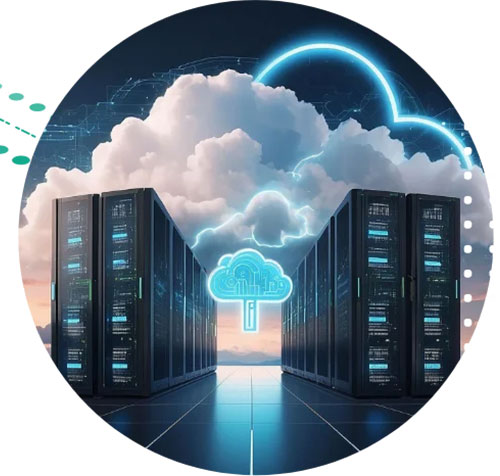Edge Computing : 5 Problems it Solves for Enterprises
In the current digital landscape, enterprises are battling with a plethora of challenges posed by explosive growth of data and the need for real-time responsiveness at edge. Traditional cloud computing architectures are struggling to keep up with the demands of modern businesses. It has pushed enterprises to constantly lookout for innovative solutions that can help enhance their operations and gain a competitive edge.
This has led to the rise of Edge Computing, a paradigm that brings computation and datastorage closer to the source of data generation, enabling processing at faster speed and higher volumes. By decentralizing processing power and reducing latency, edge computing addresses several critical challenges faced by enterprises today. As per Statista, the global edge computing market is expected to reach 12 billion US dollars by 2028 at a CAGR of 23.97% from 2020-2028.
In this blog, we will delve into the 5 fundamental challenges that it solves for enterprises, helps revolutionize their capabilities, and how it paves the way for an efficient and agile future.
5 problems Edge Computing can solve for Enterprises.
- Latency and real time processing
In the era of immediate access to information, reducing latency and achieving real-time responsiveness has become paramount for businesses. In traditional cloud architectures, data must travel from the edge devices to the centralized cloud servers, causing delays in processing and response times. Edge computing addresses this challenge by moving computational resources closer to the edge devices, thereby minimizing latency. By processing data locally at the edge, businesses can achieve near real-time analysis and decision-making, enabling time-sensitive applications like IoT, industrial automation systems to operate with lightning-fast speed and minimal delay.
For instance, retail environments with video surveillance of the showroom floor can be combined with actual sales data to discover consumer demands or most desirable product configurations. Similarly, in the healthcare sector, IoT devices enable healthcare professionals to be more watchful and connect with patients proactively. By sharing real-time data collected from IoT devices, physicians can help analyze and identify patients’ health issues. - Bandwidth optimization with Edge analytics
With the explosion of connected devices and the exponential growth of data generation, bandwidth has become a valuable and often limited resource. Transmitting all data to the cloud for processing and analysis can strain network infrastructure, result in increased costs, and lead to suboptimal network performance. Edge computing offers a solution by performing data processing and filtering at the edge devices themselves.
By deploying servers and storage at the source of data generation, edge computing makes latency and congestion virtually non-existent as storage collects and processes the raw data, while local servers implement edge analytics to pre-process it before sending to the cloud. So, instead of sending raw data to the cloud, only relevant information or actionable insights are transmitted, significantly reducing bandwidth consumption. This optimization not only saves costs but also enhances overall network efficiency, allowing enterprises to make the most of their available resources. - Enhanced Data security
Security and privacy are critical concerns for enterprises, especially when dealing with sensitive data. Centralized cloud architectures present potential vulnerabilities, as data must traverse the network, making it susceptible to interception or attacks. Edge computing, on the other hand, distributes data processing and storage closer to the source, reducing the attack surface. By processing data locally, sensitive information can be kept within the enterprise’s network perimeter, minimizing the risk of unauthorized access and data breaches.
Any data traversing the network back to the data center or cloud can be secured using encryption techniques. This decentralized approach enhances security and provides enterprises with greater control over data privacy, mitigating potential risks associated with storing and transmitting sensitive information. Additionally, it improves reliability and protects users’ privacy as well. - Scalability and cost efficiency
Edge computing minimizes the capital outlay and operating expenses. Centralized cloud architectures often face limitations when it comes scaling resources to meet evolving requirements. With edge computing, scalability is inherently built into modern architecture. The distributed infrastructure allows enterprises to easily scale their computing power by adding or removing edge devices as needed. Whether it’s adding new edge servers, edge nodes, or gateways, enterprises can dynamically scale their computing resources and distribute the computational load across a network of edge devices to handle increasing workloads or accommodate fluctuations in demand.
Edge computing offers several cost-saving benefits. First, by reducing the amount of data required to be transmitted to cloud servers. Second, by minimizing data storage costs as it’s stored and processed locally. Additionally, edge computing reduces the need for extensive network infrastructure upgrades as enterprises can make use of existing local network connections. Lastly, by offloading processing tasks to edge devices, enterprises can minimize their dependency on high-cost centralized cloud resources. This enables them to allocate resources more efficiently and avoid the need for overprovisioning, leading to cost savings. - Governance and Compliance
Enterprises operating in heavily regulated industries, such as healthcare and finance, face stringent compliance requirements regarding data storage and processing. Storing and processing sensitive data in public cloud environments can raise concerns about compliance with data protection regulations. For instance, data sovereignty law such as European Union’s GDPR defines how data should be stored, processed, and exposed.
Edge computing offers a viable solution by allowing enterprises to process sensitive data locally. By keeping critical data within their own infrastructure, organizations can ensure compliance with regulatory requirements and maintain better control over their data. This level of control and adherence to regulatory standards helps mitigate compliance risks, enabling enterprises to navigate complex legal frameworks more effectively.
Wrapping up!
As users continue to generate an ocean of data, edge computing works as a most efficient solution for enterprises. By embracing edge computing, enterprises have the opportunity to optimize resource allocation, improve system performance, and unlock new opportunities for innovation, efficiency, and competitive advantage in the ever-evolving digital landscape. However, when searching for the right partner, make sure to engage with a trusted partner like Sify with deep industry expertise, proven hybrid/multi cloud platform, automation capabilities through AI/ML, and a comprehensive portfolio of services designed to accelerate performance, increase scalability, and strengthen security in your edge deployments.
The Benefits of Colocation Data Center Management for Enterprises
Data centers have evolved into becoming a crucial component of the digital IT infrastructure of many global enterprises today. The demand for data center services in India is experiencing remarkable growth as enterprises aim to deliver superior customer experience, accelerate innovation, and become digitally enabled.
According to 6Wresearch, the data center market in India is expected to grow at a CAGR of 10.7% during 2021-2027. This growth can be attributed to key drivers such as the Indian government’s push towards digitalization, increasing Internet penetration, data sovereignty, accelerated cloud adoption, increasing usage of IoT, and the rollout of 5G. Similarly, according to GlobeNewswire, the value of the data center market in India is expected to rise to $10.09 billion by 2027 at a (CAGR) of 15.07% in the period of 2022 to 2027.
Managing a data center in India is getting more intricate by the day in today’s digital landscape. Enterprises find managing data centers to be complex and time-consuming. They need professional expertise, substantial budgets, and excellence in IT infrastructure execution to manage data centers. To meet the evolving digital demands and ensure business continuity, enterprises are now resorting to colocation, i.e. outsourcing of data center management to professional service providers. This delivers cost savings and a range of benefits, including access to subject matter experts, improved operational efficiency, agility, scalability, risk mitigation, enhanced security, and compliance with industry regulations.
To know more about Sify’s colocation data center services read here: Colocation data centre
Advantages of colocation of data center management
Here are a few advantages of colocation of data center management for enterprises:
- Cost Savings: Building and maintaining a data center requires significant capital investment and operational expenses. By leveraging the model of colocation of data center management, enterprises can transfer these costs to a service provider that has already invested in infrastructure, equipment, and personnel. This empowers enterprises to free up capital that can be redirected toward other strategic initiatives. Additionally, it can help businesses avoid losses incurred from downtime and data breaches in the long run. Moreover, colocation positively impacts Water Usage Effectiveness (WUE) and Power Usage Effectiveness (PUE) by promoting improved energy efficiency. Utilizing the capabilities of Artificial Intelligence and Machine Learning, data centers can experience savings of up to 8% to 10% on PUE. This not only contributes to environmental sustainability but also helps enterprises meet their energy efficiency goals, while maintaining optimal performance and increased savings.
- On-demand Scalability: When a business grows, its IT requirements change significantly and may require additional space, computing power, and capacity. Colocation enables enterprises to easily scale up or down as per requirement without incurring additional capital expenses or disrupting their business operations. Data Center service providers can quickly deploy new servers, storage, and network infrastructure or adjust existing configurations to meet changing business needs.
- Automation and AI/ML: Implementation of AI/ML requires careful consideration across multiple parameters. Providers of colocation data center management services can handle large volumes of data, integrate with existing solutions, and enable predictive maintenance, which ultimately helps enterprises gain deeper insights for faster decision-making, automating processes, and delivering increased efficiency & security.
- Access to Subject Matter Experts (SMEs): Colocation of data center management gives enterprises access to subject matter experts who possess specialized knowledge and experience in data center operations. They come with skills, guidance, solutions, and recommendations that can help enterprises optimize performance and minimize risks as well as free up internal resources for performing core business operations.
- Enhanced Data Security: Data security has always been a major priority for enterprises. With data dispersed across multiple touchpoints in a hybrid work model, enterprises need a multi-layer security framework. Service providers ensure comprehensive security measures across the physical security of a DC and the data hosted across on-premise, colocation, or edge to cloud. Specialized service providers come with the expertise and systems to meet industry regulations, protect sensitive data, and minimize compliance risks. Enterprises must make sure that service providers offer:
- A designated Security Operation Center (SOC) to ensure robust and resilient security
- Faster intrusion detection and prevention through multiple protocols
- Data backup and recovery in different seismic zones
- Compliance with the latest data privacy regulations and industry standards
- Adherence to Service-Level Agreements (SLAs): By adhering to the pre-defined SLAs, enterprises can enjoy benefits such as improving operational excellence, accountability, performance monitoring, risk mitigation, and cost optimization. SLAs also ensure service providers deliver the expected quality of service, provide regular reports and establish procedures for addressing issues and non-compliance penalties, which benefit enterprises.
- Improved Reliability and Business Continuity: Colocation enables enterprises to improve reliability and business continuity through specialized expertise, scalability, planning, and improved security measures. Enterprises can leverage the experience of service providers, scale resources efficiently, and solve issues proactively. This ensures there are no disruptions in business operations.
- Constant Technological Advancement: The colocation of data center management provides enterprises with constant technological advancement, including cloud on ramp capabilities. Service providers offer expertise in emerging technologies, regular infrastructure upgrades, access to cutting-edge technology, flexibility, and smooth integration through private direct connections to the cloud. It allows enterprises to be resilient and future-ready without compromising on technology and connecting their on-premises infrastructure to cloud computing systems.
Evaluate your data center needs to make the right choice
When an enterprise identifies a service provider for data center management services, it must evaluate its options based on its unique business objectives and digital priorities. Enterprises must go beyond the basic minimum criteria and focus on key differentiating factors. They must choose a service provider that focuses on:
- Cloud vision and strategy
- Hyperscale partnerships
- End-to-end managed services across multi/hybrid cloud environments
- Interconnect services to other sites and partner ecosystems
Colocation of data center management can be a valuable strategy for enterprises looking to maximize their IT resources and stay competitive in today’s rapidly-advancing digital landscape.
Sify Technologies has been providing reliable and robust data center services for the last 22 years, with a razor-sharp focus on innovation and new technologies. With the objective of delivering delightful experiences, enhanced efficiency, and desired outcomes to our customers, we have equipped all our data centers in India with automation through AI/ML capabilities. This has resulted in creating a sustainable ecosystem of connected data centers. We offer enterprises benefits such as zero downtime, reduced capital expenditure and operational expenditure, and around-the-clock support through our bankable digital data center infrastructure. Our efforts have delivered up to 20% improvement in the turnaround time to deliver critical projects.
What’s more! We also help enterprises realize up to 300 person-hour savings every month by automating customer billing. Our predictive approach to maintenance helps enterprises realize up to 20% reduction in MTBF, up to 10% improved MTTR, and up to 10% reduction in potential downtime. We comply with all the global standards and policies to prevent enterprises from penalties due to non-compliance.
Learn how our state-of-the-art data centers enable enterprises to achieve their desired business goals.





























































